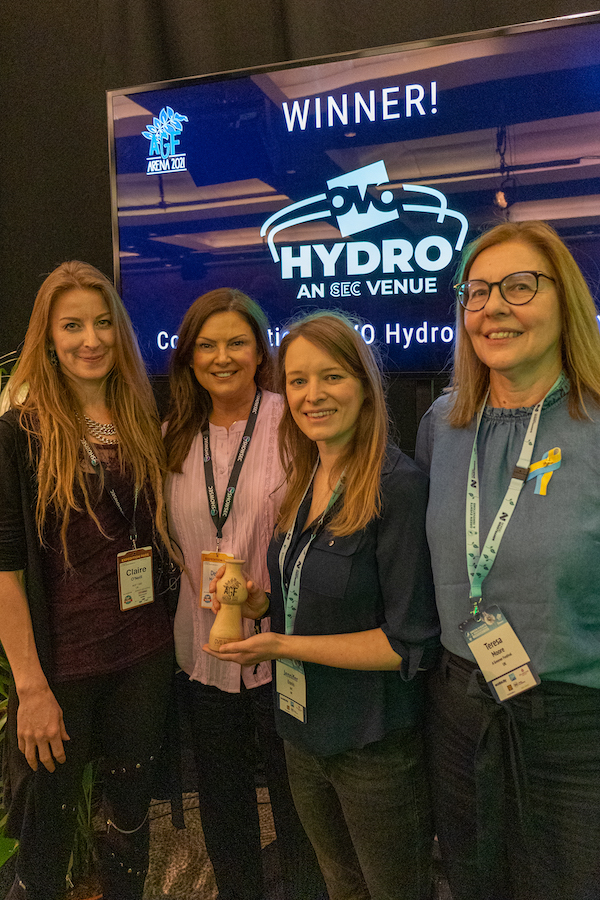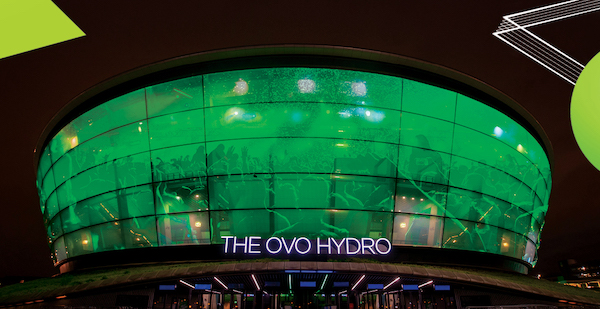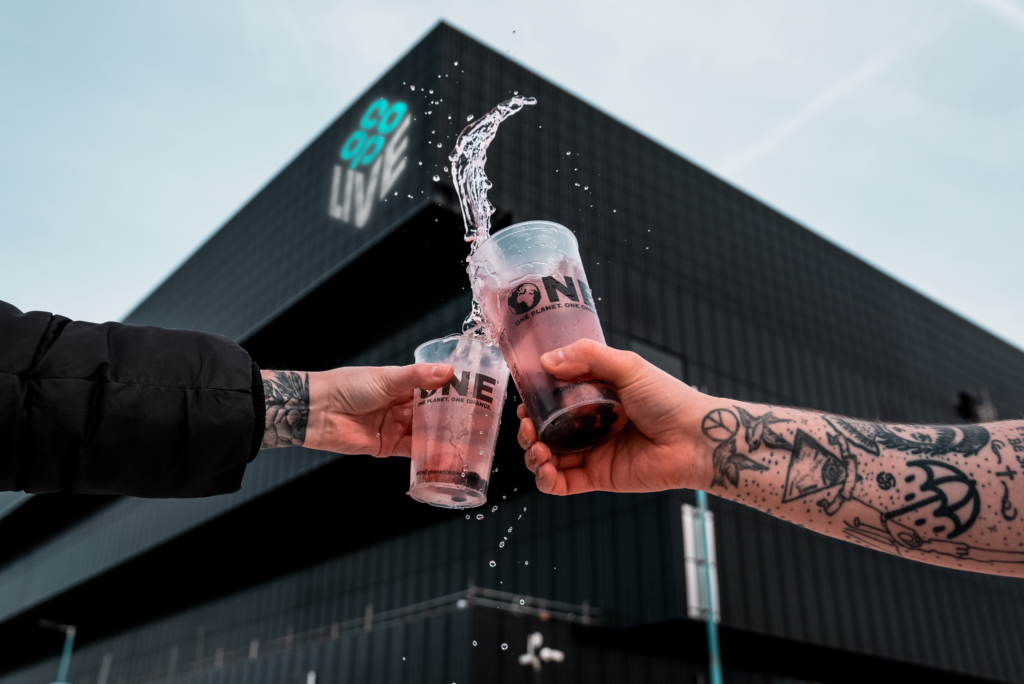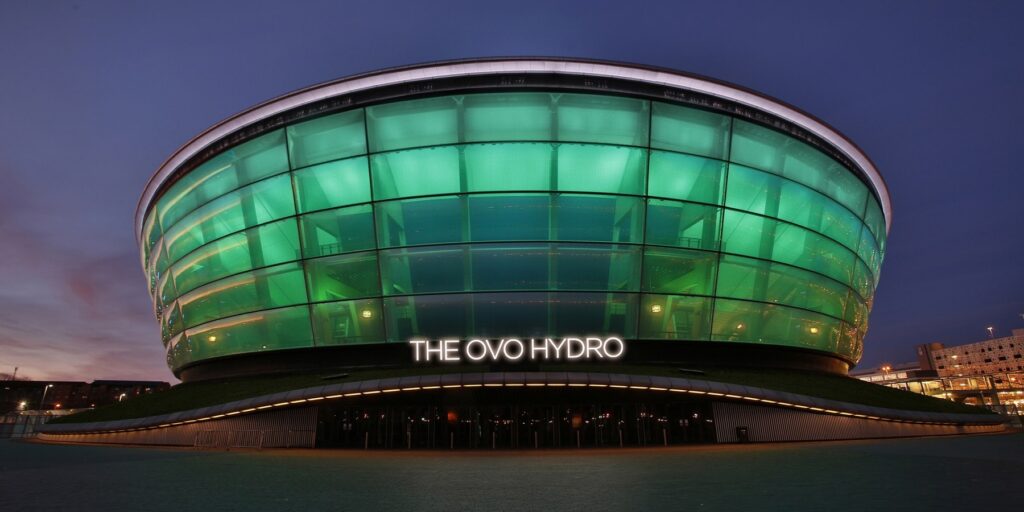The SEC are making significant progress with sustainability in their venue business. With their latest news of being awarded ‘A Greener Arena’ certification, we chatted with the SEC’s Environment and Waste Manager Jennifer Ennis about the SEC’s sustainability journey pre COP26 climate conference through to the present day…
How has hosting the UN’s COP26 climate conference last November impacted the SEC’s sustainability goals?
The SEC was already on our ‘sustainability journey’ before COP26 and were developing our Sustainability Strategy. But, COP26 brought sustainability and the environment into sharper focus in our business and provided us the chance to learn and adapt our own aims and policies and build new partnerships for a global approach to the climate crisis.
An important outcome of COP26 for the event industry was the Net Zero Carbon Events pledge, which attracted hundreds of signatories. The SEC was one of the first signatories of the Net Zero Carbon Events pledge and we are proud to say we supported the development of the project from its outset, supporting the multiple working groups which developed the project.
COP26 was certified to ISO20121 Sustainable Management System through the sustainability consultant used for the event. We inherited the paperwork used for the standard which will give us a great starting point to implement the management system into our full site and operations, which is a key target of our Sustainability Strategy.
The SEC’s sustainability strategy covers all aspects of the business. During the planning stage, were you surprised by the environmental impact of any particular area or process?
In 2021, we commissioned a carbon footprint assessment which calculated the carbon footprint of the SEC, based on a 2019 baseline. Although it wasn’t a complete ‘surprise’ we did find that our gas consumption, for heating and hot water, was a significant proportion of our carbon footprint. Although, we obviously use electricity for lighting and ventilation etc, the national grid in the UK has a high proportion of renewable energy and we’re on a renewable energy tariff for our electricity so compared to gas it had a smaller carbon footprint.
The SEC has already made significant moves to reduce carbon footprint. Which are you most proud of so far and why?
We recently launched our Sustainability Strategy. The strategy covers our 5 key goals: Climate, People, Partnership, Resource and Governance. There are specific targets under each goal, some of the key highlights are our commitment to be Net Zero by 2030 and eliminating single use plastic cups for live events.
A key highlight of our strategy was the launch of our Sustainable Food Strategy which includes a commitment to use 80% local sourcing, eliminate air freight produce, and that all packaging used will be reusable or recyclable by 2023. We’re also making strides in the fight against food waste and aim to have reduced kitchen wastage to under 1% of food purchases by 2025 or sooner.
As mentioned, a significant recent change has been the move to the reusable cups – Stack Cup – for live events. This is a milestone moment for the business which will result in the campus saving 2 million plastic cups per year and reducing our carbon footprint by 1,500 tonnes in the next 10 years. A key part of our journey towards net zero by 2030.
OVO Hydro was recently awarded ‘A Greener Arena’ certification. What were the top drivers that led to the certification?
A Greener Arena is now setting the standard on sustainable arenas so to be the first venue in the world to achieve the award is brilliant. The key driver for obtaining the certification was to compliment the OVO Hydro’s status as a world leading venue, and to demonstrate our commitments to becoming a more sustainable campus.
The award assessment is incredibly comprehensive, and it covers a lot of areas we are already working to improve – energy, waste, environmental protection, carbon, water and green travel. So, it is a great way to complement our Sustainability Strategy we have in place.
A key element of the A Greener Arena award is continuous improvement and as part of the award, we will receive a feedback report which lists recommendations and improvement opportunities which have been identified during the process. The feedback report will consider all the areas which were reviewed as part of the assessment. The SEC will look to develop and implement the recommendations outlined as far as practical, and we hope to improve our AGA award ranking in future years.

Out of all the processes and actions that the SEC have planned for the rest of 2022, which do you think will have the biggest impact on sustainability in the short term and the long term?
In the short term, our sustainability strategy relies on continuous engagement, communication, and training, both our own teams, but considering all the ‘touch-points’ of our strategy like event organisers, visitors, delegates, contractors, exhibitors, and suppliers and how we influence and change behaviours around waste management, green travel, and energy. This is a key focus for 2022.
In the long term, the biggest area we can make a difference in the future is achieving our commitment to Net Zero 2030. Central to our 2030 target is the development of our ambitious energy strategy which will facilitate this transition and focuses on generating renewable energy onsite. This goal also focuses on reducing our carbon footprint through energy management, water efficiency and green travel. Already, 100% of our electricity comes from renewable sources.
How will the SEC’s sustainability initiatives and actions impact the sustainability of tours and events that happen at the venue, and how can artists, promoters and event organisers help the SEC achieve its sustainability goals?
A key part of our Sustainability Strategy is engaging with our event organisers and supporting them to make their events more sustainable. Artists, promoters and event organisers can play a significant role in supporting our sustainability strategy.
We recognise that hosting an event in an environmentally sustainable way can be a challenge and that is why we have developed our Sustainable Events Toolkit which provides the guidance event tours need to make their time at the SEC as sustainable as possible. The toolkit includes guidance around energy and water efficiency, green travel, waste and catering. By following the guidance in the toolkit, event tours can support our Sustainability Strategy but will also make their event more sustainable.
We have also developed the SEC Waste Protocol which outlines how event organisers and their teams should segregate waste onsite and it also outlines the do’s and don’ts of waste management onsite. By following the waste protocol document, event organisers can significantly increase the recycling rates for the SEC and your event.
How can fans help the SEC achieve its sustainability goals?
Every one of our visitors can support our sustainability strategy – by using green or active travel, ensuring that our reusable Stack-Cups are returned so they can be washed and reused and by being careful not to litter outside our venues. We have in place a Sustainable Visitor Charter which outlines how visitors can support our Sustainability Strategy, this is on our website and is displayed on our screens. If our visitors read and implemented the small changes where possible, it would make an enormous difference.
What impact will SEC’s sustainability actions have on the city of Glasgow?
We are fortunate that Glasgow City Council is incredibly ambitions in their carbon targets, with commitments to Net Zero 2030. Our carbon commitments are aligned to Glasgow City and we will continue to work together to develop our Net Zero 2030 roadmap.
Do you have any tips for other large venues around the world who are looking to go Net Zero?
A really important first step is to establish your baseline year for carbon, which could be 2018 or 2019, whichever suits and is your last full year of events before Covid19. On top of that, developing system to improving your measurement and tracking of utility, waste, diesel, travel, water and wastewater and material use data is really important to understand and track your carbon footprint and establish where improvements can be made. Internal reporting on progress and to address issues as they arise is also an important step.
You could also look into signing up to the Net Zero Carbon Events Pledge or the Live Green pledge and tap into the support and resources they provide, as well as, becoming part of the community of event organisers and venues looking to deliver Net Zero.




